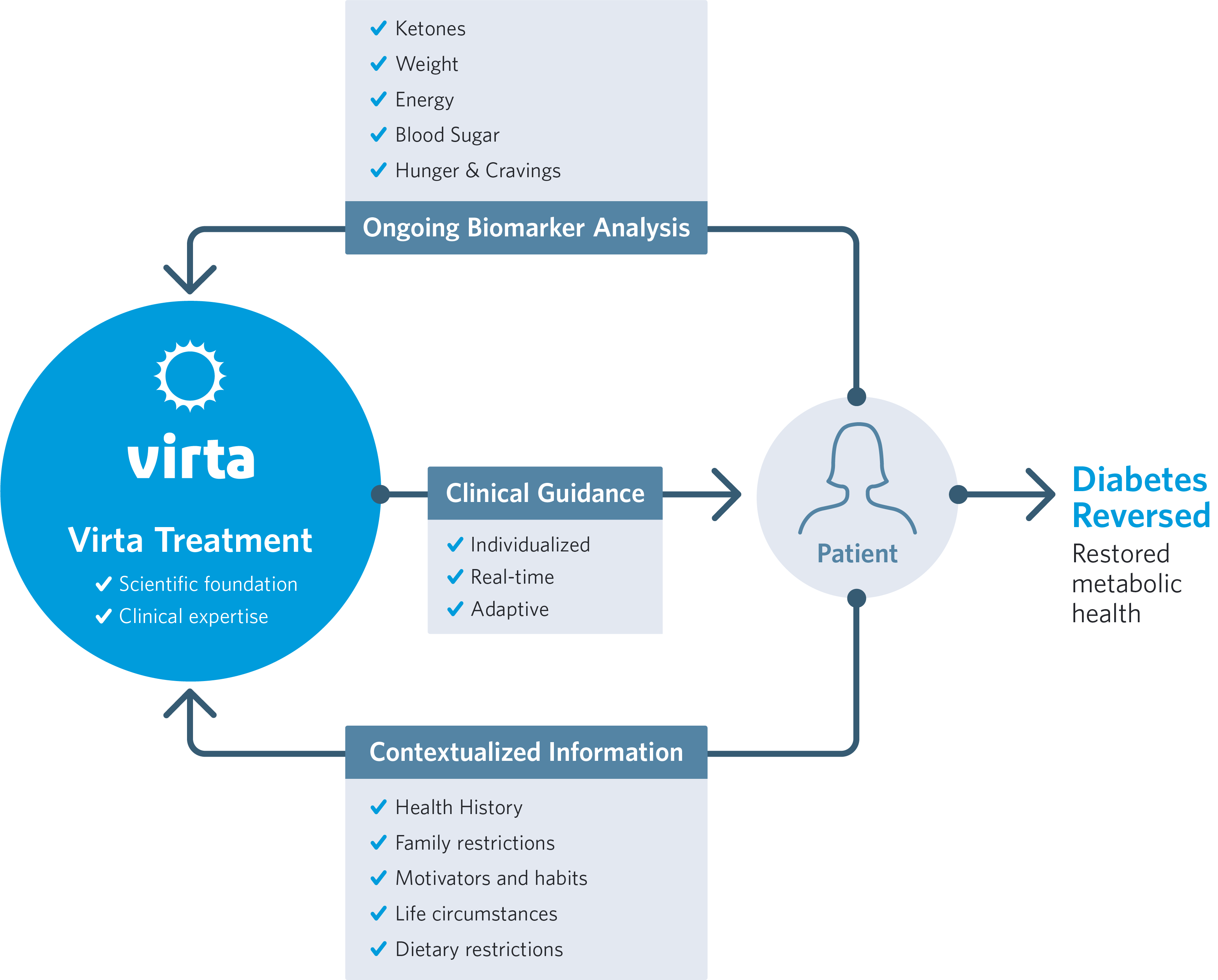
Type 2 Diabetes Reversal at Scale—What is Behind the Virta Program?

This month marks one year since Virta publicly launched. We’ve now shown that the Virta program delivers quick and sustained type 2 diabetes reversal and significant improvements in other chronic metabolic diseases. Millions of people living with type 2 diabetes now have an effective, long-lasting and accessible alternative to the status quo of more medication, lower quality of life, and uncertainty of what the future will hold. Many have asked, how do we deliver these outstanding outcomes, and what’s behind the Virta program?
First, we haven’t accomplished all of this in one year. Virta’s scientific foundation is based on decades of research and began when my co-founders, Drs. Jeff Volek and Stephen Phinney, started researching metabolic health and nutritional ketosis. Second, now our science, data science, engineering and clinical teams have taken that original work and its protocols and turned it into the Virta program, a scalable and highly individualized protocol that can be delivered remotely and in most cases through a smartphone.
From the patient point of view, the Virta program is very simple: it consists of careful medical supervision, medication adjustments, day-to-day support and an individualized approach to carbohydrate restriction to achieve nutritional ketosis.
However, to deliver the Virta program and our results on a population level (the 99%, not just the 1%), requires a very complex protocol with nearly infinite bits of personalization. In other words, there is no set program for Virta patients. We deliver an individualized, proprietary protocol, and we achieve this personal touch by taking into account thousands of details that make each patient unique. That's the only way to succeed at scale.
What does this mean in practice? Here are six ways in which the Virta program addresses the uniqueness of each patient, each day, to achieve long-term success:
1—Pursue science, period.
Virta is rooted in scientific rigor and a dogged pursuit of understanding the drivers of insulin resistance. Our ongoing peer-reviewed clinical trial continues to add to our our founding team’s body of research, and our ability to deeply understand what may be contributing to any one patient’s metabolic health. This ensures that our decisions are always evidence-based.
2—Match the treatment to the patient’s existing lifestyle, not the other way around
We gather a large amount of contextual information upfront that can be considered at every subsequent moment of the Virta program. This information is critical to each decision we make, and includes, for example:
- Medical and surgical history, medications, and other diagnoses
- Lifestyle, such as motivations, habits and current behaviors
- Dietary restrictions or preferences, such as being vegetarian or gluten-free
- Family circumstances, including food access and budget, and who makes decisions about nutrition
3—Adjust based on body’s unique response
We carefully monitor each patient’s progress over time and gather dozens of data points each day. Blood-based biomarkers, medication status, symptoms, and subjective feedback (for example, hunger level) are just some of the many examples of the data we collect daily. Based on this data we know how each patient is responding and we can adjust the Virta program recommendations accordingly, near real-time.
4—Use clinical expertise and technology to extract signal from noise and deliver safe treatment
We analyze all the information coming in each day and decide whether there is a signal (vs. noise) and a reason to intervene. For example, a blood glucose reading in one context is completely normal, while in another context it requires attention. Most importantly, this combination of physician supervision and continuous monitoring of biomarkers supports our ability to deliver safe care.
5—Identify and analyze root causes for every issue encountered
If an intervention is needed, we deduce the root cause to define the optimal control. For example, we may identify that a higher than expected blood glucose reading is due to eating too much protein for dinner. Is that because of lack of understanding of the right approach? Or is it done knowingly? Or is it because there is an underlying behavior health issue? Or something else? We always try to get to the root cause.
6—Contextualize root causes to guide treatment
Before we make a recommendation to the patient, we consider context. Often, the instruction can be simple: “please reduce your long-acting insulin by X units tomorrow morning.” In other situations, two separate issues may share the same root cause but require vastly different controls based on patient context. Take the prior example of eating too much protein for dinner. In some cases we recommend focusing on portions to eat slightly less protein overall. In others we may recommend adding more fat to a meal to reach satiety sooner.
To generalize, we collect dozens of data points from each patient each day, and then decide the appropriate individualized control to keep each patient on track towards long-term metabolic health and type 2 diabetes reversal. We repeat this process thousands of times for each patient.
When all these variables and potential controls are combined, we’ll end up with millions of different permutations. What seems simple on the surface becomes a highly complex protocol that is necessary to ensure efficacy and safety, both short-term and long-term at the population level.

That is the Virta program, which allows us to deliver outstanding outcomes that last.
We’ve now optimized our protocol with thousands of individuals and use data from every new patient to further improve Virta. In other words, the more patients we treat, the better results we can deliver to the next patient. It is this iterative model that allows us to deliver consistent results under constantly changing circumstances.
We’ve got a long way to go, but we’re excited about what we’ve accomplished, and we hope you are, too.
Dr. Sarah Hallberg on the one-year results of Virta's clinical trial
This blog is intended for informational purposes only and is not meant to be a substitute for professional medical advice, diagnosis, or treatment. Always seek the advice of your physician or other qualified health provider with any questions you may have regarding a medical condition or any advice relating to your health. View full disclaimer
Are you living with type 2 diabetes, prediabetes, or unwanted weight?







.jpg)

